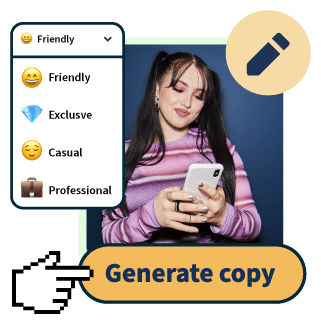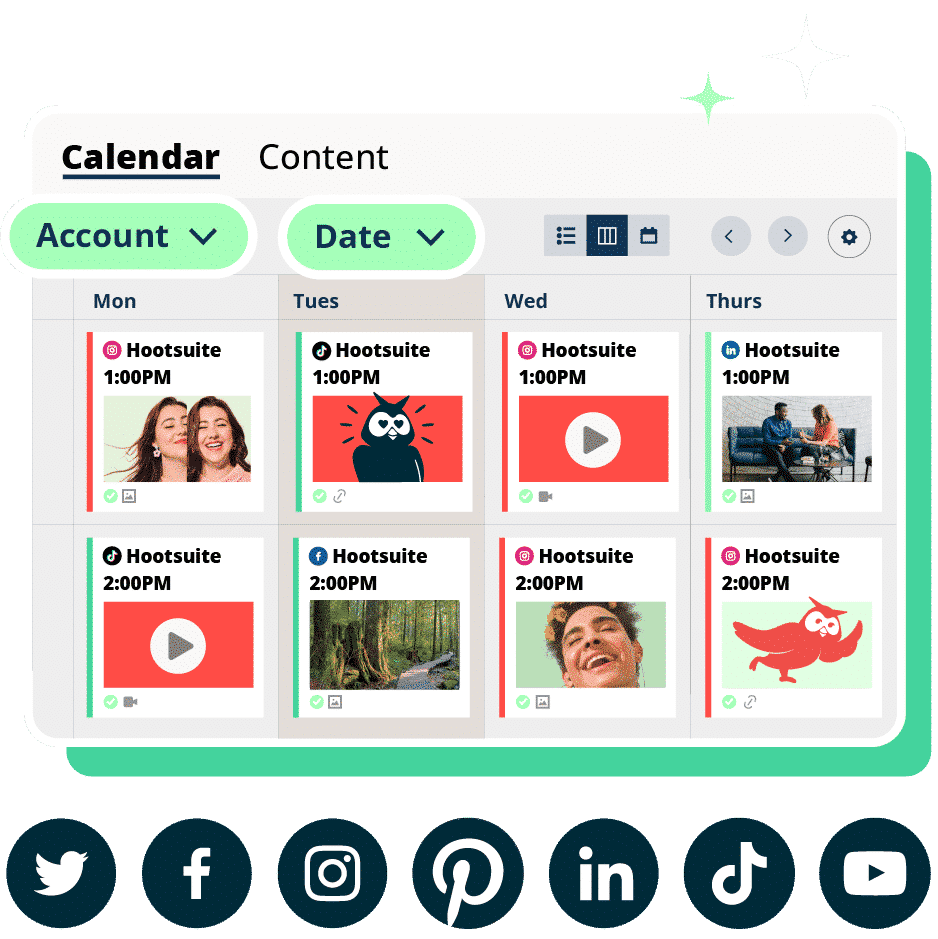Stop scrolling right now. This blog post will change your life. Okay, maybe not — but it will teach you how to create an effective social media hook for TikTok, Instagram, and beyond.
(See what we did there? We used a hook.)
When it comes to engaging Instagram’s 2 billion active users and TikTok’s 884 million active users, capturing attention is more than half the battle. Here’s everything you need to know about hooks, plus examples from the folks who do it best and the ultimate thumb-stopping social media hook hack (spoilers: it’s Owlywriter AI).

OwlyWriter AI instantly generates captions and content ideas for every social media network. It’s seriously easy.
Start free 30-day trialA social media hook is text, a photo, video or audio that immediately grabs a social media user’s attention. A hook is always one of the very first things presented to the user—for example, the first few seconds of a TikTok or the first photo posted in an Instagram carousel.
The purpose of a TikTok or Instagram hook is essentially to get the user to stop scrolling, and to engage with the content in its entirety: hooks create intrigue, capture attention, and hold it. That’s not far off of the literal definition — as in, a fish getting hooked — but in this case, after Reeling ‘em in (get it?) we’ll be ethically releasing our catch.
A great social media hook gets attention and sustains it. An excellent hook makes the user believe that the rest of the content will be valuable to them in some way—that value could be information, advice, entertainment, etc.
Good hooks are presented to the user immediately (TikTok suggests that the first two seconds of a video are crucial for getting an audience’s attention). Hooks should appeal to your target audience base and set up a user’s expectations for what’s to come. An awesome hook is a promise that the content is worth watching.
And finally, a hook should be true. Yes, you might draw a few people in with hooks that make wild, inaccurate claims about the rest of the video (for example, How I Won An Olympic Gold Medal in Prancing or I May Look Like a Regular Person But I Am Actually Nine Guinea Pigs in a Trench Coat), but you won’t grow your follower base or create any kind of loyal audience if you’re not being truthful. Be engaging, but be honest.
TikTok hook examples
Now you know the dos and don’ts—here’s evidence that great hooks make a difference on TikTok.
Give away the ending
Starting by sharing the subject of your TikTok—for instance, by using text or audio to describe what happens in the video—means your audience knows exactly what’s coming.
This TikTok lets viewers know what to expect using text overlaid on top of the video. Anyone watching knows immediately what the video is about—a drawing of Taylor Swift created by writing her name hundreds of times—but users are prompted to stick around to see what the end result looks like.
Ask and answer a question
And here’s the total opposite of the last example: asking a question at the beginning of your TikTok will encourage viewers to keep watching for the answer.
There’s probably no better example of this than getting hooked into watching a one-minute video of a slice of bread. 5.7 million people have. It’s not because the video itself is interesting; it’s because everyone wants to know the answer to the question “Will I ever be loved?”
Hot tip: This video also exemplifies an awesome strategy for increasing engagement: when you post videos replying to comments, people are more likely to comment on your videos.
Be fast and loud
Kicking off your video with some good old-fashioned aggression will definitely snap a viewer out of their mindless scroll. It sounds obvious and ridiculous, but this strategy can actually be incorporated into lots of different niches.
For example, there’s baking. This bagel-making TikTok starts off with a dough slam that’s debatably unnecessary but inarguably attention-grabbing. Any kind of swift movement or loud sound is sure to get attention (just make sure it’s followed by something that’s actually entertaining or useful).
Assert your expertise
There’s certainly no shortage of people trying to give advice on TikTok, so if you’re an expert in a particular field, tell your audience right away.
This TikTokker starts her video by asserting her position as an expert—in this case, a dermatologist—making viewers more likely to listen to her hot takes on skincare.
Start with a “do” or a “don’t”
A hook that is assertive and instructional—for example, a direction starting with “always” or “never”—will pique the interest of many viewers. Especially when it’s timely advice.
This TikTok is a perfect example. The creator posted it around Thanksgiving, when lots of Americans had turkey on their minds, and began the video by saying “Do not throw your turkey carcass away.” It’s followed by step-by-step instructions for making pho: useful, timely, and worth a watch even for folks who’d more likely get takeout than cook turkey.
Declare your stitches
Stitching other videos on TikTok is an excellent method for creating your own content. Instead of coming up with an idea out of the blue, you can respond to or create a conversation with another creator.
But because viewers will see the video you’re stitching first, and not your personal content, it’s a good idea to hook them in by letting them know a stitch is incoming.
Using the text “Stitch incoming” is the most common way to do this. The original TikTok above posted by Alix Earle got lots of funny (but good-natured) stitches from mothers showing what they actually look like at school pickup.
This hook alerts viewers that they’re about to see a stitch, and should keep watching to see what’s next.
Instagram hook examples
How do you hook on the ‘gram? Learn from the pros.
Hooks for Instagram posts
You can hook in your Instagram audience with an engaging caption, but the content itself can also play hooky: here are a few strategies.
Make a carousel quiz
Instagram carousels create a great opportunity for testing out social media hooks: on average, they get three times the engagement of regular posts on IG.
Creating a quiz that your audience has to swipe through is one way to utilize carousels. Hook users in by asking an interesting question and you’re all set.
Attach audio to your feed posts
Now, you can add audio to your still posts on Instagram, so you can hook in speed-scrollers with trending tunes, seasonal songs or throwback favorites.
This post from Dua Lipa is the perfect example of using audio: she announces a new song in the still image, and adds the song to the post so that it automatically starts playing when a user is viewing the image.
(This is sadly only offered on mobile — if you’re reading this blog post on your desktop, you won’t hear the audio).
Create text posts
Sure, a picture’s worth a thousand words, but it generally takes a little longer to read text than it does to look at a photo—and hooks are all about increasing the amount of time a user spends viewing your content.
Because Instagram is mostly image- and video-based, a simple text post stands out, especially if that text post is funny.
The post above from Sheertex is a good example: the simple user-generated review is both hilarious and engaging.
Hooks for Instagram Reels and Stories
It’s video time again: here are some examples of top-notch hooks for Reels and Stories.
Use cool editing and transitions
Video editing tools make transitions a breeze on social media, and an interesting transition at the very beginning of your video will hook your audience in.
This Reel is full of neat transitions — it’s satisfying to watch, regardless of how interested the viewer is in the content itself.
Here’s another example of engaging editing. Instagram may be more than a photo sharing app, but beautiful photos still grab attention on this social media platform.
Hop on a trend
A trending song or sound is often enough to hook viewers in — they’ll recognize the trend and watch your reel to see your take on it.
Again, this works especially well for humorous trends.
Incorporate text in a unique way
The Reel below delivers a simple message (”We’re waiting for you”) in a very artistic, distinct way. Each word is visible in its own distinct clip.
It’s almost like an “I spy” to get the message, and reading each word prompts you to stick around ‘till the end.
Reference the end of the video at the beginning
Ah, the oldest (and best) trick in the book: “Wait for it.” Tempt your audience to pause their scroll by beginning your Reel with a reference to the end.
This Reel doesn’t specifically ask viewers to wait until the end of the video. It’s more subtle. But users know from the text at the video’s start that the grandparents are the ones to watch… and the grandparents just happen to be at the end.
Post useful videos
Beauty is in the eye of the beholder, but utility is almost universal: hook in a viewer by immediately showing them how beneficial your video will be to them.
This Reel on how to poach an egg starts with a perfectly poached egg, asserting the creator’s position as a capable poacher. Anyone who doesn’t know how to poach an egg — or wants to improve their soft yolk skills — is tempted to keep watching.
Don’t forget to add a call to action at the end. After all, the only way a user can guarantee they’ll keep seeing your useful Reels is by following you.
Make a command
Similar to a “do” or “don’t,” commanding a viewer to stop a certain behavior (especially a common one) will generally get their attention. This isn’t necessarily because your target audience is eager to change their behavior. But they’ll watch your Reel anyway.
Hair styling videos often use this tactic. I can’t tell you how many videos I’ve seen that tell me the way I put my hair in a ponytail is wrong. But do I watch them to the end, just to see what I’m missing? Absolutely.
Confuse your audience
Say what? Yes, sometimes confusing your audience — just for a moment — is an awesome way to get attention (toddlers have really cornered the market on this strategy IRL). A curious viewer will want to figure out what happens next.
The Reel above starts with a clip of a person using a marker to draw a dot on their camera’s screen. Drawing on a screen is unusual behavior, prompting the audience to keep watching to see what’s up.
How to create engaging hooks with OwlyWriter AI
Hooking a fish takes patience, but writing a hook can be done in seconds — especially when you have AI copywriting on your side.
Owlywriter AI is a writing tool built specifically for social media managers. It’s integrated into Hootsuite’s composer, and is available with all Hootsuite plans. Here’s how to use it.
Once you’ve logged into Hootsuite, click the Compose icon near the top of the left menu.
Next, click Post.

This will bring you to Hootsuite’s Composer. The next window will prompt you to use OwlyWriter AI to write social captions. Select Create a caption now.

On the next page, select Start from scratch. Then, scroll until you find HOOK post.

Owlywriter will prompt you to describe your company. Type in a sentence about who you are and what you do. I made up a recycled basketball company for the sake of this example, but in your case, it’s best to go with something real.

Hit Create caption and in a few moments, Owlywriter will generate not only a hook, but an offer, unique angle and kicker. This would be the perfect opportunity for a soccer pun — maybe I should have gone with that instead of basketballs. What a home run.

Save time managing your social media presence with Hootsuite. Publish and schedule social media posts across networks, find relevant conversions, engage your audience, measure results, and more — all from one simple dashboard. Try it free today.








